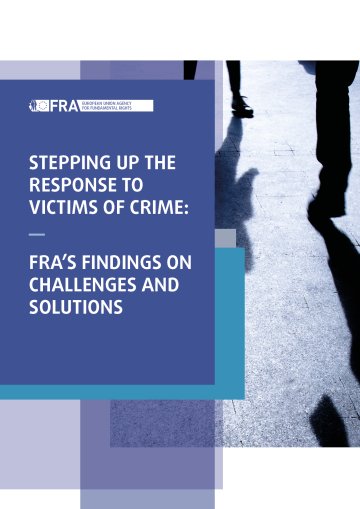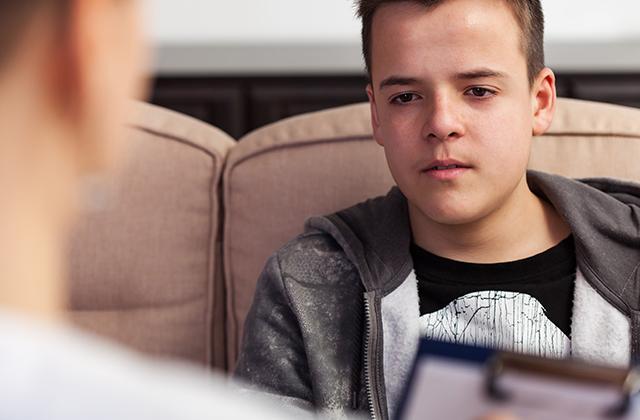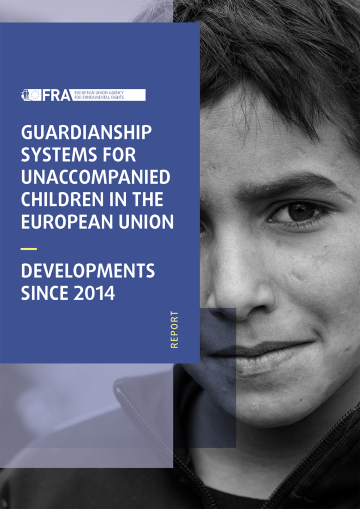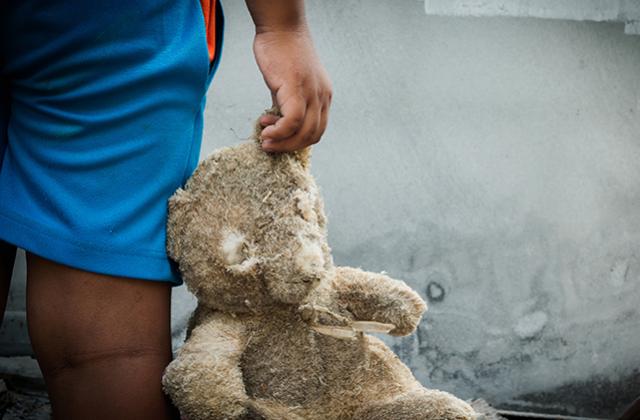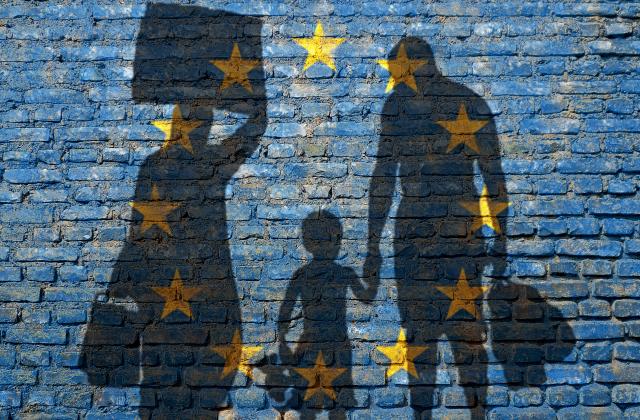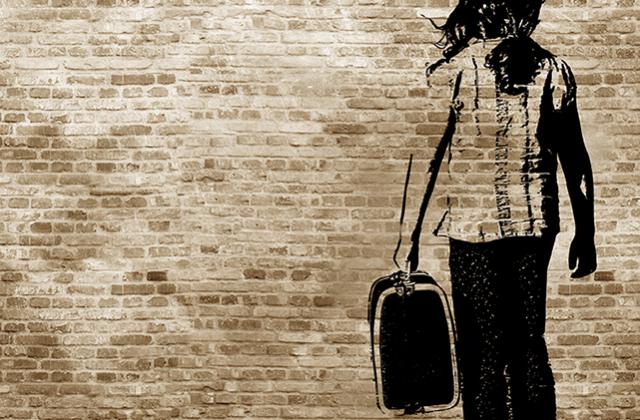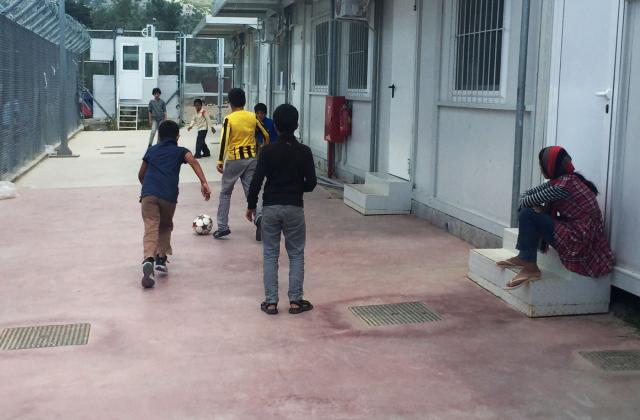Children in migration are vulnerable and face significant risks, especially when unaccompanied or separated. These children’s circumstances vary. Some travel with their families. Others are left behind by migrant parents or embark on solitary migration journeys without parental or adult protection. Many undertake perilous journeys, often fleeing conflict, persecution or poverty. They can easily become victims of exploitation, trafficking and abuse, and suffer psychological and physical harm.
As parties to the CRC, all EU Member States must ensure that children in their territory enjoy access to all the rights in the convention, independent of their nationality, birth or other status, Article 2 of the CRC states.
On 1 January 2022, around 6.6 million children did not have citizenship of their Member State of residence. This accounted for 8.2 % of the total number of children living in the EU and 17.6 % of the total number of non-national residents. Germany (27.6 %), France (16.6 %), Italy (15.8 %) and Spain (14.2 %) are the main Member States hosting non-national children in absolute terms in 2023, according to Eurostat.
There have been increased refugee and migrant flows in Europe since 2015. The Russian war of aggression against Ukraine has also triggered the migration of children since 2022.
Children in migrant families encounter a range of challenges, such as discrimination and economic insecurity. They often face critical issues related to access to services in important areas of life, such as health, education, housing and employment opportunities. The EU has adopted an extensive acquis in the area of international protection for families and children seeking asylum in Europe.
Both the reception conditions directive (Directive 2013/33/EU) and the asylum procedures directive (Directive 2013/32/EU) stress the importance of considering the child’s best interests in all procedures involving children. A child should grow up in a family environment. Children who are temporarily deprived of their family environment, including migrant children, are entitled to special protection and assistance.
Unaccompanied children seeking to obtain international protection in the EU are entitled to a set of additional procedural guarantees within the framework of examination of their applications, in line with the requirements of Article 24(2) of the reception conditions directive and Article 25 of the asylum procedures directive. They must be provided with suitable and safe reception conditions. These include placement with a foster family, accommodation centres with special provisions for children or other suitable accommodation.
Key findings
- Most Member States have amended their national legislation or have presented new legislation regarding children in the context of migration since 2014. The areas/topics national legislation covers vary.
- Several Member States introduced legislation related to the legal status of third-country nationals, which also applies to children. This legislation updates national law related to admission, procedural aspects and deportation.
- Several Member States introduced changes to legislation related to legal representation and guardianship, according to FRA’s 2022 guardianship research.
- Several Member States reported amendments that aimed to enhance protection of unaccompanied minors. These addressed residence permits for unaccompanied children and the conversion of permits on reaching the age of majority.
- Family-based care systems are still underutilised for migrant children. Very often child protection and migration legislation are not aligned. There is a fragmentation of the relevant procedures among various bodies.
- Access to health services, especially preventive care, became the subject of amendments in several countries.
Member States have introduced legislative amendments on several child-related issues. Amendments relate to financial support for children, families and people in need of international protection.
In December 2022, the Finnish parliament adopted amendments to the Aliens Act that is relevant for children. It repeals the requirement to have sufficient financial resources for persons with international protection who wish to bring their family members to Finland.
In Ireland, a child arriving at a port of entry or at the International Protection Office who is not in the custody of an adult will be referred to the Child and Family Agency, according to the International Protection Act 2015.
Another area of national legislation concerns guardianship and temporary protection provided to children in Germany and Luxembourg.
In Germany, the Child and Youth Welfare Authority must appoint a guardian for unaccompanied children entering the country, according to legislation introduced on 1 November 2015 and revised in 2019. During the procedure, siblings are not separated. Unaccompanied children who do not have relatives in Germany must be placed in a regular residential care facility or foster family provided by the Child and Youth Welfare Services (§ 42a, 42b of Social Service Codebook VIII, Sozialgesetzbuch VIII).
In Luxembourg, the Act of 18 December 2015 on international protection and temporary protection was amended in 2021. This transferred the jurisdiction for appointing ad hoc administrators from the guardianship judge to the family affairs judge. Ad hoc administrators are responsible for assisting and representing unaccompanied children in international protection procedure.
In 2021, the Federal Ministry for Family Affairs, Senior Citizens, Women and Youth published guidelines for minimal standards for (joint) refugee accommodations in Germany. The guidelines outline necessary steps to ensure children’s safety and develop a child-friendly environment. They also consider the special needs of people with disabilities and mental health problems, and those of LGBTIQ+ people.
Amendments to laws concerning unaccompanied children represent most of Member States’ legislative changes, especially in Bulgaria, Czechia, France, Greece, Hungary, Lithuania, Malta and Slovenia.
In 2018, Bulgaria’s amendment to the rules on the implementation of the Foreigners in the Republic of Bulgaria Act introduced legal definitions of unaccompanied children and accompanying persons. It also established a procedure for identifying and safeguarding them and eliminated short-term detention options. In 2020, an amendment to the Asylum and Refugees Act introduced requirements for specialised lawyer representation for unaccompanied children seeking international protection. This applies until they are reunited with their parents or guardians.
With regard to unaccompanied children in Czechia, the Act on the residence of foreign nationals stipulates that if an unaccompanied third-country national refuses to participate in the age determination procedure, they are viewed as an adult. They are considered an unaccompanied child if the results of the age determination are not conclusive, in line with Article 25 of the EU asylum procedures directive.
In France, the Social Action and Family Code amendment of 2022 introduces several changes. These include a change in the national distribution key for unaccompanied children, the addition of socio-demographic and young adult support criteria and the prohibition of departmental councils reassessing minority and isolation status.
Greece’s Law 4960/2022 introduced an emergency mechanism for unaccompanied minors identified in precarious living conditions.
The Hungarian Act on the protection of children and the administration of guardianship affairs(1997) does not include unaccompanied children aged 14 to 18 during a ‘crisis caused by mass immigration’.
The Lithuanian Law on the legal status of foreigners (2004) was amended in 2022 regarding unaccompanied migrant children due to the Russian war of aggression against Ukraine. A representative is immediately appointed to unaccompanied foreign children, that is, temporary guardianship/curatorship is established, during their stay in the territory of Lithuania, regardless of the legality of their presence, Article 32(1) states. The mayor of the municipality appoints the representative.
In Malta, the Minor Protection (Alternative Care) Act (2020) was amended in 2021 and 2022.
Slovenia adopted the International Protection Act in 2016. A child, an unaccompanied child and a single parent with a child are all deemed ‘vulnerable groups with special needs’ who have a right to special care and treatment, according to its latest amendment in 2021.
Topics related to age assessment were introduced in the amendments of laws in only a few Member States, for example France. Here, the Act of February 7, 2022 on child protection establishes the prohibition of reassessing age and the obligation for responsible bodies to cooperate.
Health and health-related issues of migrating children are the subjects of legislative changes in several Member States, such as Croatia, Czechia, France and Spain.
Croatia’s Law on compulsory health insurance and health protection of foreigners(2022) regulates access to healthcare for third-country nationals, including children.
In Czechia, the Public Health Insurance Act of 2021 expanded the public health system’s scope to include children of third-country nationals. This change significantly expands public health insurance’s coverage of children.
In France, the Social Action and Family Code (2022) mandates a compulsory health and prevention check-up for children entering the child protection system, including migrating children. The check-up aims to identify prevention and care needs to improve the child’s physical and psychological health. The Civil Code allows the Child Welfare Service (Aide sociale à l’enfance) to request authorisation from a juvenile court judge in cases of abusive or unjustified parental authority refusal or negligence.
The Spanish Organic Law 10/2022 on the comprehensive guarantee of sexual freedom aims to promote the prevention of sexual violence and guarantee the rights of all victims. It applies to women and children who have experienced sexual violence in Spain or abroad, regardless of their nationality or administrative status.
7.1. Policy development regarding children in migration
In recent years, some Member States have developed specific national programmes and action plans to reduce the risks unaccompanied children face and to better accommodate their needs.
In Belgium, the national action plan against gender-based violence 2021–2025 mentions the need to ensure that gender-based violence is taken into account in asylum and migration policies.
In Bulgaria, the national programme for the prevention of child violence and abuse (2023–2026) aims to develop training materials on children’s rights, refugee protection and migration. It aims to translate them into various languages and adapt them for children. In 2022, the Minister of Labour and Social Policy approved a coordination mechanism for cases of unaccompanied or separated children, including children seeking or receiving international protection.
In Luxembourg, the national action plan for children’s rights provides for giving children a document that describes the age assessment procedure in accessible language and reflects the holistic and scientific approach currently used.
The Slovenian programme for children 2020–2025 creates a multi-tier system that considers individual needs and vulnerabilities, strengthens placement in foster families and creates an individual development plan for each child.
Spain approved the model for the management of migratory contingencies for unaccompanied children and adolescents in 2022. It points out the need for a contingency model to address emergency situations in migration crises. The model is based on co-responsibility, cooperation and interterritorial solidarity. It allows children’s referral and integration.
In 2020, the Italian Authority for the Protection of Childhood and Adolescence released guidelines for the selection, training and enrolment of voluntary guardians. They emphasise principles such as prompt appointment, non-discrimination, independence, quality, transparency and migrant child participation.
Since 2018, Greece’s policies have been addressing the rising number of homeless and unaccompanied children in migration. Support for this includes street work, the establishment of a Special Secretariat for the Protection of Unaccompanied Minors (SSPUAM), voluntary relocation programmes, research studies and the abolishment of protective custody, the legislative establishment of a National Registry for the Protection of Unaccompanied Minors which will operate under the responsibility of the SSPUAM of the EL Ministry of Migration and Asylum, and a national emergency response mechanism for homeless children, set up with the support of the Office of the United Nations High Commissioner for Refugees and transitioned to SSPUAM.
Council Directive 2001/55/EC of 20 July 2001 defines temporary protection status and the conditions of applications. Council Decision 2022/382 of 4 March 2022 introduced temporary protection. It established the existence of a mass inflow of displaced people from Ukraine within the meaning of Article 5 of Directive 2001/55/EC. On 28 September 2023, the European Council agreed to extend the temporary protection to cover 4 March 2024 to 4 March 2025 [9] Eurostat, Statistics Explained (2023), ‘Temporary protection for persons fleeing Ukraine – monthly statistics: who are the people fleeing Ukraine and receiving temporary protection?’.
.
One third of the over 4 million people who are receiving temporary protection in the EU are children, according to Eurostat.
Children arriving from Ukraine fleeing the war must be quickly identified, registered and monitored during their transit through a Member State or during their temporary stay, including with a view to preventing possible abuse, neglect or human trafficking situations or detecting them early on. It also aims to ensure the implementation of all measures necessary to ensure and protect their rights.
Key findings
- The consequences of the Russian war of aggression against Ukraine and its particular impacts on children displaced in the EU are evident in many Member States, especially those neighbouring Ukraine. The relevant and applicable legal and regulatory frameworks and responses vary between Member States.
- Some Member States reacted quickly and set up special electronic registration platforms for children displaced from Ukraine which were not necessarily linked to the national child protection systems. Member States found it necessary to have specific guidelines for these children.
- Some Member States, particularly Ukraine’s neighbouring countries, saw the need to change their legislation to support children and families fleeing Ukraine. Others found that their legislation was sufficient in this respect.
- Some Member States established blue dots hubs with UNICEF and the Office of the United Nations High Commissioner in the early days of the conflict. The hubs offered children and families displaced from Ukraine practical support and information as they moved onward. They also provided specialised expert support for children travelling alone, women with young children, people with disabilities and other vulnerable groups.
-
In some cases, the Member States’ action plans on the European child guarantee were adjusted to include specific provisions accounting for the needs of children and families arriving from Ukraine [10] See Figure 3 in FRA (2022), ‘Children fleeing Ukraine – fundamental rights challenges’.
. - Some Member States endeavoured to find quick and practicable solutions to integrate Ukrainian children, particularly in education. However, some special challenges have been identified for Ukrainian children from vulnerable groups, such as Roma.
Belgium, Croatia, Denmark, Estonia, Hungary, Latvia, Lithuania, Poland, Romania, Slovenia and Slovakia amended their legislation to support children and families fleeing from Ukraine, though in different areas of regulation. Some strengthened integrated childcare services: Croatia, Lithuania, Hungary and Romania. More detail is provided in FRA’s 2023 report, The Russian aggression against Ukraine – Displaced children finding protection in the EU - Bulletin 3.
France and Austria needed no special legislative amendments, they report. This is because their legislation already provides for several measures in this area, such as access to education and healthcare, particularly through the incorporation of Council Directive 2001/55/EC into national law.
In Belgium, the Flemish Region had the means to quickly establish mobile units, that is, container classrooms. These increased the capacity of schools and accommodated newly arrived children from Ukraine.
Poland’s Ministry of Science and Higher Education signed a memorandum of understanding with UNICEF to address Ukrainian children’s educational exclusion. This included support for teacher training, mental health and inclusive education.
In Hungary, asylum-seeking children have the right to public education. However, the complex administrative procedure can be challenging for Roma children. Pre-existing educational disadvantages in Transcarpathian Roma children further undermine their chances of enrolling in public education. Administrative requirements, such as a registered address and social security number, can be complicated without local knowledge and assistance.
Portugal has launched an electronic registration platform for children displaced from Ukraine. This facilitates the identification, reception and visualisation of the availability of temporary shelter and voluntary transport programmes.
In Sweden, in 2020, the National Board of Health and Welfare developed a handbook on unaccompanied children. It aimed to complement other guidance on the investigation, placement and follow-up of cases within social services concerning children and young people. The handbook has been particularly useful since 2022 with the increased number of unaccompanied children displaced from Ukraine.




